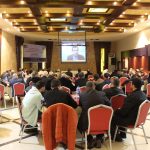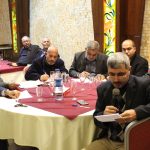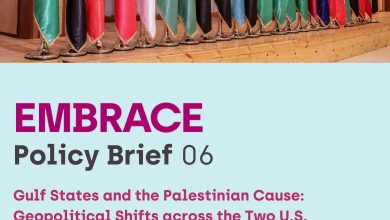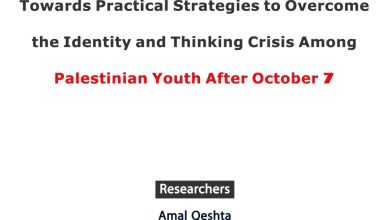Mr. Joe Macaron “The current US administration has no clear understanding of the Middle East.”
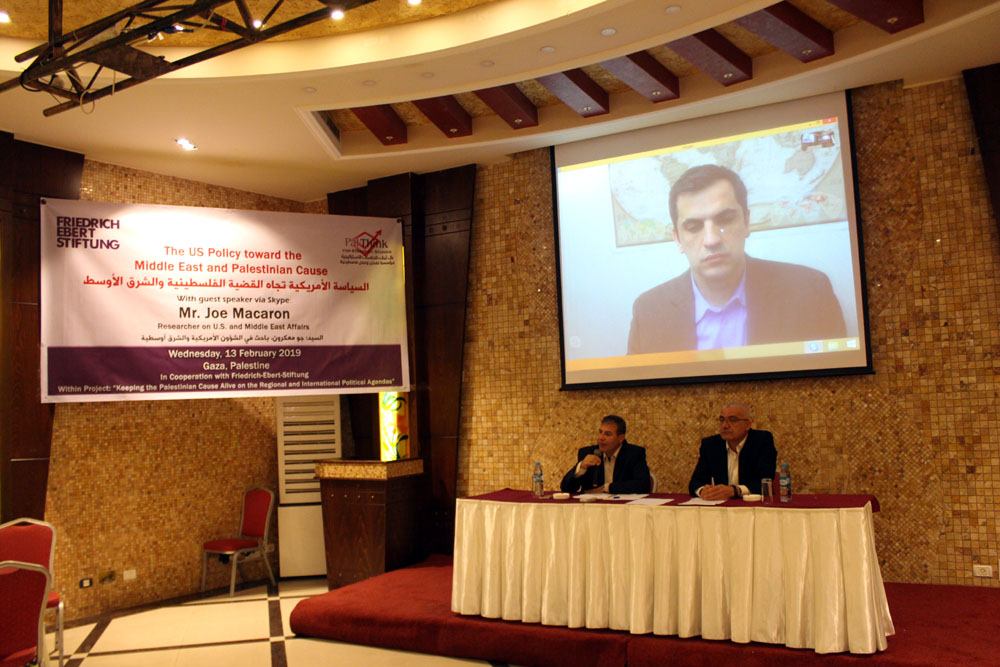
The workshop entitled “The US Policy Towards the Middle East and Palestinian Cause” implemented in partnership with Friedrich-Ebert-Stiftung within the project “Keeping the Palestinian Cause Alive on the Regional and International Political Agendas.” The session took place on Wednesday, February 13, 2019, at the light-house Hotel, Gaza City.
The Guest Speaker is Mr. Joe Macaron; a fellow at the Arab Center Washington DC and Researcher on US strategy, international relations & conflict analysis in the Middle East. The roundtable had over 75 participants including researchers, activists, political leaders, Journalists, NGOs professionals, and lawyers attended the roundtable session to engage in discussing US policy towards the Palestinian cause.
Mr. Omar Shaban, Pal-Think’s director, welcomed the attendees and noted that despite all challenges imposed on Gaza, Pal-Think for Strategic Studies as an independent organization continue to foster dialogue and to keep in touch with the international community, which connect people in Palestine with the rest of the world.
Dr. Usama Antar, the Programme Manager at the FES branch office in the Gaza Strip, noted the importance of the session’s topic, he also pointed out the importance of this partnership with Pal-Think on the project, the roundtable discussion is a very effective method in promoting awareness through dialogue and constructive debate. Especially, with the lack of understanding for the position of the international community to better support international-Palestinian relations and decision-making. He stressed that it is necessary during the current political events to address the scarecrow “deal of the century” and not to submit blindly to Western policies.
Mr. Macaron pointed out that the summit was initially meant to assure allies that the US remains engaged in the Middle East despite Donald Trump’s decision to withdraw US troops from Syria. But the major objective is to reinforce the Trump administration vision of having an Arab-Israeli alliance to deter Iran even before resolving the Palestinian-Israeli conflict. The current US administration is reversing the Obama administration’s policy on the Iran’s nuclear deal and does not seem interested in giving the impression of playing the role of an honest broker between Palestinians and Israelis.
He also noted that as if the Trump administration is turning the Palestinians into a collateral damage of the Arab-Israeli alliance against Iran by denying them their major bargaining cards even before unveiling the peace plan. Mr. Macaron argued that achieving Palestinian-Israeli peace is not high on the US agenda, as President Trump is consumed by its political crisis at home and by deterring Iran. However, the US diplomatic and economic pressure is meant to bring Tehran to the negotiation table not to initiate a military confrontation.
Mr. Macaron highlighted the unprecedented secrecy surrounding the so-called deal of the century where the parties of the conflict are not informed or consulted, nor they have negotiated the draft peace plan. A handful of officials in Washington, led by Jared Kushner, have access to this plan with no consultations with key US government agencies or Arab and European allies. Trump is giving Netanyahu a blank check and the Israeli Prime Minister is playing along but is tacitly aware that a breakthrough is not in the horizon, most notably given the political dynamics in Israel.
The crucial challenge facing Palestinians moving forward, according to Mr. Macaron, is not to undermine the already failing US peace plan but to avoid the scenario of taking alone the blame of this failure. Palestinians are also better advised not to pick between the US led camp in the Middle East and the alliance between Russia, Iran and Turkey.
Mr. Macaron noted that the Trump administration’s attempt to punish the West Bank and launch development projects in the Gaza Strip is reinforcing Palestinian divisions instead of encouraging reconciliation. Moreover, this tactic is reminiscent of the George W. Bush Administration’s policy in 2007-2008 when Washington sanctioned Gaza and provided aid to the West Bank to advance a peace process.
He argued that trends in the past decade have shaped the Palestinian issue. It has lost its centrality as an Arab issue since 2011 as the upheaval began across the region. Deterring Iran became priority and new alliances emerged in the Middle East. Moreover, the peace camp in Israel has weakened, the Palestinians divisions were reinforced, and there was a shift in the US perspectives on Israel given the demographic changes and the emergence of a leftist wing in the Democratic party. The deal of the century could bring the Palestinian cause back to the forefront, hence Palestinians should seize the moment, reorganize their efforts, reinvent their tools and rhetoric to engage each other and the outside world while attempting to overcome their internal divisions.
Addressing the question of how the US public opinion looks at the Palestinian issue, Mr. Macaron remarked that since the 2008 economic recession, the US public has looked inward with less interest in foreign affairs and is increasingly more invested in following domestic issues, most notably given the ideological divide between liberals and conservatives. Hence, the Palestinian issue is expectedly not on the US radar and nor is a high priority for the Trump Administration. There is room to play a larger role in bringing attention back to the Palestinian issue with concerted efforts by the Arab American groups in Washington and across the United States.
- Learn more about Mr.Macaron: http://bit.ly/2GIklHd
- Learn about Pal-Think’s previous roundtable with the French Analyst Alain Gresh: http://bit.ly/2SWPrBy




